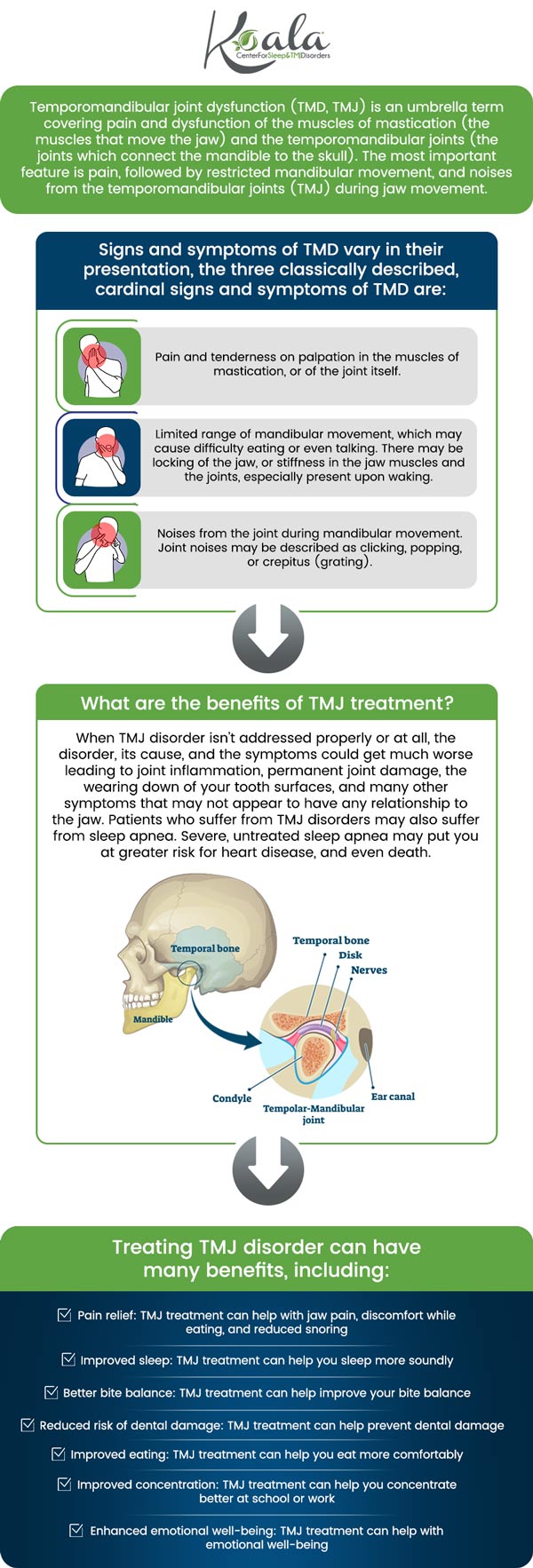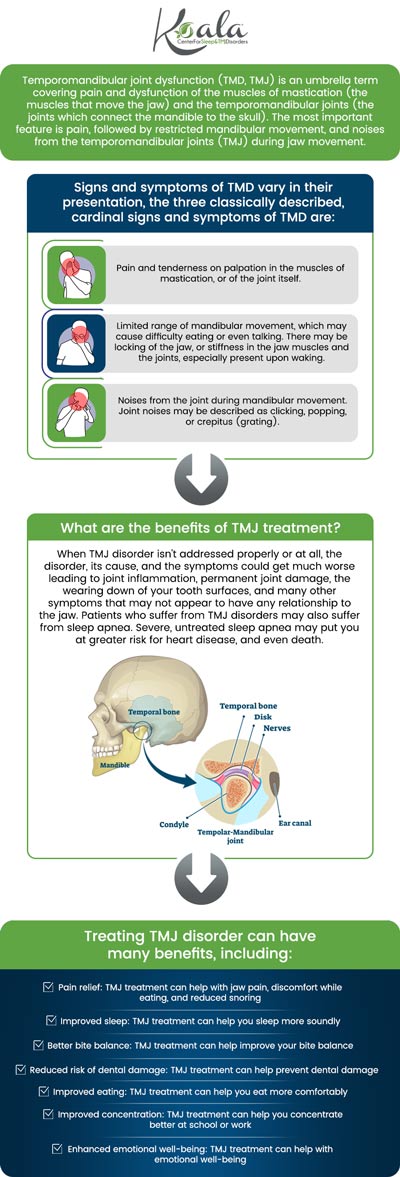How Do You Diagnose TMJ Disorder?
If you believe you have TMJ disorder, trust the TMJ specialists at Koala® Center For Sleep & TMJ Disorders for a professional and thorough diagnosis. We can help you determine the root cause and develop a treatment plan that uniquely addresses your needs. For more information call us at one of our clinics today or request an appointment online. We serve patients from all over the USA. Locations in Bloomington IL, Peoria/Dunlap IL, El Paso TX.




Table of Contents:
How do doctors test for TMJ?
What is the most common cause of TMJ dysfunction?
How do I know if I have TMJ?
TMJ refers to the two temporomandibular joints that connect the jaw to the skull. This joint is essential for basic functions like eating, talking, drinking, and even yawning. When this joint is experiencing pain, it can greatly impede one’s quality of life. People experiencing TMJ disorder symptoms should receive a professional diagnosis as soon as possible in order to maximize the chance of successful treatment and to minimize the chance of complications.
Testing for TMJ is an important step prior to treatment. Currently, there is no standardized test to correctly identify TMJ. It can be difficult to determine, as dental conditions, such as a toothache or sinus problems, can cause similar symptoms. In the majority of cases, the description of symptoms, combined with a simple physical examination of the face and jaw, provides useful information for diagnosing TMJ disorders. A dental TMJ specialist may also take x-rays and make a cast of a patient’s teeth to see how their bite fits together. They may also request specialized x-rays for the TM joints.
In many cases, there is no identifiable cause for a TMJ disorder. Trauma to the jaw or joint can often lead to symptoms of TMJ disorder. There are also other health conditions that may contribute to the development of TMJ disorders, including:
– Arthritis
– Erosion of the joint
– Habitual grinding or clenching of the teeth
– Structural jaw problems present at birth
There are some other factors that are often associated with the development of TMJ disorders, however, they may lack clinical evidence to support these claims. These include:
– Poor posture that strains neck and face muscles
– Prolonged stress
– Poor diet
– Lack of sleep
You may have TMJ if any of the following apply to your situation:
Clicking or Popping — A clicking or popping sound in the jaw is an extremely common symptom, although it does not typically require treatment if it is the only symptom present.
Pain with Jaw Movement — The jaw muscles try to compensate when the teeth are not properly aligned. Pain in the jaw while chewing is common. Some people experience pain when yawning or speaking.
Other Pain — TMJ can cause referred pain in the form of neck pain, shoulder aches, headaches, and even toothaches. The pain may worsen when moving the jaw. However, it can sometimes be felt at rest.
Locking Jaw — A lockup in the jaw or a stiff jaw joint can be a sign of TMJ. This can manifest as difficulty opening the mouth wide or closing it again.
Tired Facial Muscles — To compensate for TMJ, the facial muscles may work harder. Let your dentist know if your face feels tired or saggy on one side. Some people have persistent and unabating discomfort, while others experience pain only after using their jaw.
Trouble Chewing — Many people with TMJ have trouble chewing since the jaw is out of alignment. This can make it near-impossible to chew if the misalignment is severe.
TMJ may present other symptoms not mentioned here. If you are experiencing symptoms that you believe are related to TMJ, receive a professional evaluation by a qualified dentist.
If you or someone you love is experiencing the signs and symptoms of TMJ disorder, come to Koala® Center For Sleep & TMJ Disorders for a professional diagnosis. Our kind and caring TMJ specialists can help you determine what is causing your symptoms and develop a treatment plan that uniquely addresses your needs. Our TMJ specialists are dedicated to delivering the highest level of service to each patient, at every visit. Call us today to book an appointment. We look forward to serving you!

Additional Services You May Need
▸ KoalaKIDZzz®
▸ Sleep Apnea
▸ Snoring
▸ TMJ Disorder
▸ Fatigue
▸ Sleep Disorders
▸ Weight Loss
▸ CPAP Alternative
▸ Oral Appliances




